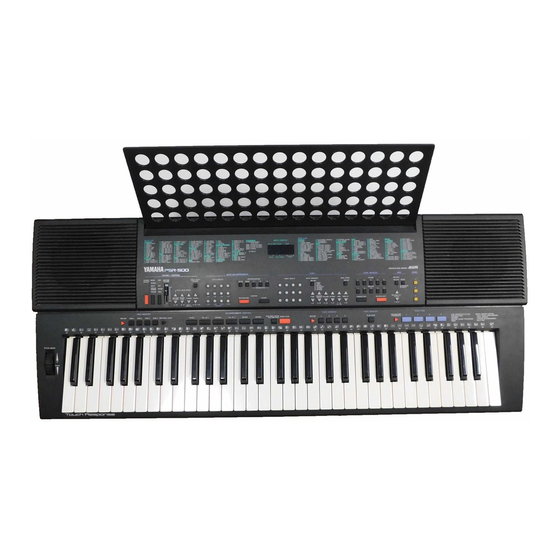Yamaha PortaTone PSR-400 Instrukcja obsługi - Strona 41
Przeglądaj online lub pobierz pdf Instrukcja obsługi dla Klawiatura elektroniczna Yamaha PortaTone PSR-400. Yamaha PortaTone PSR-400 48 stron. Yamaha electric keyboard owner's manual
Również dla Yamaha PortaTone PSR-400: Instrukcja obsługi (48 strony), Instrukcja obsługi (47 strony), (Niemiecki) Instrukcja obsługi (48 strony)

Something not working as it should? In many cases what ap-
pears to be a malfunction can be traced to a simple error that can
be remedied immediately. Before assuming that your PSR-400/
PSR-500 is faulty, please check the following points.
PROBLEM
1.
• The PSR-400/PSR-500 speakers produce a "pop" sound
whenever the power is turned ON or OFF.
CHECK
• This is normal and is no cause for alarm.
PROBLEM
2.
• No sound.
CHECK
• Is the MASTER VOLUME control turned up high enough?
• Is the power turned on? The Auto Power Off function auto-
matically turns off the power if no buttons or keys are
pressed for more than about 10 minutes when running the
PSR-400/PSR-500 from batteries.
• Are a pair of headphones plugged into the PHONES jack?
Have you accidentally plugged the foot pedal into the
phones jack?
3.
PROBLEM
• Rhythm won't start or no rhythm sound.
CHECK
• Is the accompaniment volume turned up high enough?
• Is the ORCHESTRATION RHYTHM button turned on?
• Are you sure you pressed the START button?
• Perhaps the PSR-400/PSR-500 is in the SYNCHRO
START mode, so all you have to do is start playing.
4.
PROBLEM
• Auto accompaniment won't function. No lower keyboard
sound.
• Location
Avoid exposure to direct sunlight or other sources of heat
Never leave it inside a car where it can get very hot. It may
cause discoloration or deformation. Vibration, excessive
dust, cold, low or high humidity can also cause malfunction.
• Handling
Avoid rough handling. Don't drop or jolt the PSR-400/
PSR-500 as this can damage the internal circuitry. Pressing
too hard on keys or controls may lead to malfunctions.
When cords are plugged into the rear panel jacks, pay par-
ticular attention not to apply excessive force to them since
this may damage the terminals or internal circuitry.
• Cleaning
Clean the exterior with a soft, dry cloth. Using chemical
solvents may damage the finish.
APPENDIX C: TROUBLESHOOTING
APPENDIX D: MAINTENANCE
CHECK
• Auto accompaniment won't sound right if the FINGERED
mode is selected and you're using SINGLE FINGER type
fingering or improper chord fingering.
• Are you sure you're playing in the left-hand section of the
keyboard when the FINGERED or SINGLE FINGER
mode is selected?
• Are all ORCHESTRATION buttons on?
5.
PROBLEM
• Auto accompaniment chords don't seem to change prop-
erly.
CHECK
• Are you playing chords that the PSR-400/PSR-500 can
recognize (see chord types on page 18)?
6.
PROBLEM
• Abnormal operation not listed above. Complete lack of
control.
CHECK
• The internal microprocessor may have been "locked up"
due to static electricity or other causes. Turn the instrument
OFF for a moment, then turn it ON again. If the lock-up
makes it impossible to turn the power off, remove the bat-
teries or unplug the AC adaptor. If you turn the power back
on within about 10 minute the previous contents of the
memory will be safely retained.
7.
PROBLEM
• Sustain pedal operation is reversed (press-OFF, release-
ON).
CHECK
• You probably held the pedal pressed while turning the
power on or inserting the pedal plug into the FOOT
PEDAL jack. Turn the power off and then on again with
the pedal released.
• Interference Through Electromagnetic Fields
Do not use your PSR-400/PSR-500 close to television
sets or other equipment receiving electromagnetic signals as
this could cause interference noise in the other appliance.
• Service and Modifications
Your PSR-400/PSR-500 contains no user serviceable
parts. Opening it or tampering with it in any way can lead to
electrical shock as well as damage. Refer all servicing to
qualified YAMAHA personnel.
YAMAHA is NOT responsible for damage caused
by improper use.
39
